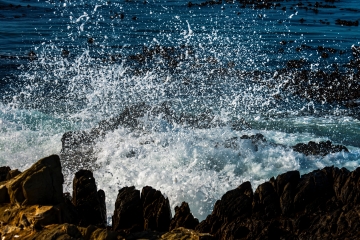771125_Smelly Seas_360 px width.jpg

Evaporated sea spray is one of the major contributors to the smell of the ocean. Credit: Daniel Case, CC BY-SA 3.0
A team of astronomers recently reported the possible discovery of a compound in the atmosphere of another planet that could be produced by life. If the compound really is there, then the planet might smell familiar—like a day at the beach.
Many factors go into creating the “smellscape” of the sea. Locally, things like pollution, red tides, and decaying seaweed can make the beach smell less than pleasant. Globally, though, the two major odors come from evaporated sea spray, and from a compound of sulfur and carbon known as DMS—dimethylsulfide—the compound that might have been seen on the other planet.
Microscopic organisms in the water produce a related chemical compound. When they die, they release it into the water. Bacteria and enzymes convert it to DMS. A lot of it then enters the atmosphere—about one ton per second.
In the air, it’s destroyed within 48 hours, releasing particles of sulfur. Water vapor gloms onto the sulfur, creating clouds. The clouds reflect sunlight, helping control global temperatures. In fact, some scientists have looked at DMS as a way to combat global warming. They suggest pumping nutrient-rich water from the deep ocean up to the surface. That would feed outbursts of the organisms that start the DMS chain—creating more planet-cooling clouds.
In any event, perhaps astronomers on some distant world might find life on Earth by detecting DMS in our atmosphere—the living “breath of the sea.”

